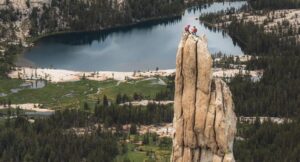While COVID-19 has aborted or postponed countless expeditions around the world, others have found themselves stranded in midstream, unable to continue yet often unable to find a way home. Here, the latest updates on some of those.
Out of Eden Walk
In 2013, former war correspondent and National Geographic correspondent Paul Salopek started a 34,000km walk to retrace our ancestors’ global migration. Starting in Africa, he plans to make his way across the world to the tip of South America. Over the last seven years, he has trekked 18,000km across Africa, the Middle East and Central Asia. Currently, he is stuck in place in Myanmar. Although few cases of coronavirus have occurred there, the government has taken preemptive steps to stop its spread.

Paul Salopek waits in Myanmar to restart his journey. Photo: cbc.ca
Salopek notes that many of the places he has already walked through may cope better with the pandemic than those in the western world. “They’re, in some ways, even more prepared for it than people who are in the Global North — people in Canada, the United States or Europe — who haven’t had to contend with this kind of massive disruption at least in three generations or so, going back to World War II,” he said.
Salopek hopes that he will be able to restart his walk in late summer and make his way across Thailand, Laos and China.
Running from the UK to Nepal
In July 2018, the exuberant Rosie Pope started her run from the UK to Kathmandu. The 8,500km route will eventually take her through 18 countries but she is currently stalled in Turkey. The pandemic became serious as Pope was wending her way through northern Turkey. At the age of 73, despite her fitness, she still falls in the most vulnerable category, and police began to trail her.

Rosie Pope looks on the bright side at the Hilton Safranbolu. Photo: ft.com
On March 30, she was ordered to stop running. She had just passed a hotel and so turned around and checked herself in. She is now the only guest at the hotel and is running up and down the stairs three times a day to stay fit. The hotel kitchen is closed, so she is surviving on tea and pasta that she cooks herself on her camp stove. While she is grateful to her hosts, “I hate being stuck here,” she admits.
She also worries that she might be deported. Whatever happens, she is determined to reach Nepal, even if that means returning to the UK and finishing the last 5,000km when the world returns enough to normal that such projects are again possible.

Rosie Pope reaches Berlin in late 2018. Photo: ft.com
Round-the-world cyclist and cat
In September 2018, Dean Nicholson left his home in Scotland to cycle around the world. Three months later, as he was peddling his way up a hill in Montenegro, he heard mewing and found a tiny grey-and-white kitten, who had decided that she was going to adopt him. Since then, Nala has been his constant companion, as he continues to cycle around the world. In February, Nicholson reached his 18th country and Nala’s 10th — Hungary.

Dean and Nala spin their wheels in Hungary. Photo: @1bike1world
Nicholson went briefly to London in March to arrange a visa for Russia, leaving Nala with friends in Budapest. The embassy in London wanted to keep his passport for a few days, but Nicholson decided that he couldn’t afford to wait, amid the ever-growing travel bans. He had vowed never to leave Nala, so he flew back to Hungary and they are now on lockdown there together. If Nicholson’s 90-day visa runs out before they are able to leave, he will try to extend it. For now, they are passing their time making lockdown videos.
UK Circumwalk
Last year, 53-year-old Karen Penny began circumwalking 30,000km around the UK. She had completed 10,310km but had to hit pause in March when the UK implemented its lockdown. “On a cold and blustery day here in Shetland, I have had to make the very difficult decision to break off from my walk and return home to South Wales,” she said.

Karen Penny in Shetland. Photo: Karen Penny
And some notable postponements…
5,000km over the Himalaya in six months
Belgian ultrarunner Peter Van Geit had planned to spend his summer fast hiking the trails and passes of the Indian Himalaya. After spending three months in the Himalaya in 2019, he wanted to double his time and cover 300 new passes across the region. He had initially planned to begin in April but tried to bring his trip forward to avoid the ever-increasing lockdowns. But as he made his way to the Himalaya, the state of Himachal Pradesh blocked the entry of all foreign and domestic travelers.

Peter Van Geit in the Himachal Pradesh in 2019. Photo: Peter Van Geit
He is now at home in Chennai waiting with “all maps and gear ready to get out again as soon as things settle.” But he worries that India’s outbreaks are a few weeks behind Europe’s, which will likely delay the easing of restrictions in his adopted country.
Vagabonding Africa
As one-half of the quirky duo known as The Hairy Handlebars, Ben Cook cycled last year from London to Tokyo. He was finalizing his kit for a two-year, 12,000km solo walk across Africa when COVID-19 stopped him in his tracks. He is now biding his time at home in the UK, ready to begin once restrictions ease. He plans to start in Cairo, cross 10 countries and finish in Cape Town.

Ben Cook en route from London to Tokyo. Photo: adventure cookie.co.uk
Unofficial First ExWeb Expedition
ExplorersWeb writer Ash Routen and editor Jerry Kobalenko would have been most of the way through their 700km Baffin Island ski expedition by now. The duo were to have hauled from the hamlet of Clyde River, midway up the east coast of the world’s fifth-largest island, to Pond Inlet, on the north coast.

East Baffin Island includes the highest cliffs in the world in Sam Ford Fiord, a magnet for big-wall climbers and BASE jumpers. Photo: Jerry Kobalenko
Routen, who skied the length of Lake Baikal in 2018, and Kobalenko, who has done 20 previous manhauling expeditions, were to have left on March 25 but missed the COVID cutoff by two to three weeks, when the territory of Nunavut first discouraged, then shut its borders to visitors from the south. They have rescheduled their sea-ice journey for 2021.





